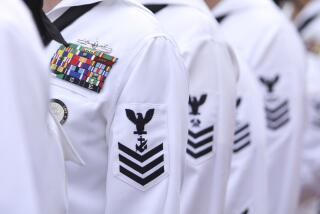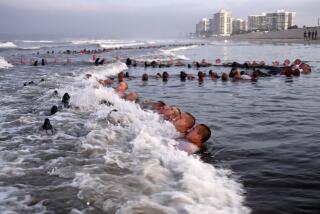Navy SEAL Goes on Trial in Death of Iraqi Prisoner at Abu Ghraib
- Share via
SAN DIEGO — Amid special procedures to safeguard secret CIA and Navy SEAL missions, the court-martial of a Navy lieutenant accused in the death of an Iraqi prisoner began Monday.
Lt. Andrew K. Ledford, a SEAL team member and 1995 graduate of the Naval Academy, is accused of assault, dereliction of duty, filing a false report and conduct unbecoming an officer in the death of Manadel Jamadi at the Abu Ghraib prison on Nov. 4, 2003.
Ledford, who faces a maximum 12 years in prison, was part of an elite SEAL unit assigned to find and arrest “high-value” Iraqis and bring them to the prison for interrogation by the CIA.
Jamadi died within an hour of being brought to the prison. His body, packed in ice, was smuggled out to avoid infuriating other prisoners, according to prosecutors.
He had been suspected of involvement in an attack on the Red Cross facility in Baghdad that killed 12 people.
The CIA also thought he might have had information about future attacks and weapons caches.
Pictures were taken of smiling Army personnel hovering over his body.
Of 10 SEAL team members charged with abuse involving Iraqis, Ledford is the only one to be ordered to a court-martial; the other cases were handled by a senior officer with authority to mete out punishment, but not incarceration.
Six officers from the Navy’s Special Warfare Command, which includes the SEALs, were seated as jurors. Several have been deployed to war zones, but none has seen combat. One has experience interrogating prisoners.
Two CIA operatives who may have interrogated Jamadi are listed as possible witnesses.
Navy Cmdr. Chris Reismeier, the court-martial judge, ruled that their names would not be spoken aloud.
Also, their faces would be blocked from public view by a thick blue curtain.
Each juror was given a sheet of paper with the names of the two to see if they were known. The sheets were then collected and ordered destroyed.
Jurors, who are allowed in courts-martial to ask questions, were instructed to be careful not to provide details about secret SEAL missions. When one juror mentioned that he knew one of the Navy witnesses from a deployment in Afghanistan, Reismeier stopped the juror and told him to “talk around” such details.
Reismeier said the court might be closed to reporters and spectators on days when secret information would be discussed.
He declined a request from prosecutors to order reporters not to mention the defendant’s name. The decision to print or broadcast the name of the defendant and other witnesses is “up to their conscience and their editors,” he said.
Still, Reismeier worried aloud that information disclosed during the trial -- including how Jamadi died -- might cause an adverse reaction in the Arab world.
“Everyone has seen the reaction overseas when some of these things are in the public record,” he said.
In the military equivalent of a pretrial hearing, Ledford’s name was not spoken. Ledford is accused of hitting Jamadi and also allowing his subordinates to beat him.
Jamadi allegedly died an hour after he was brought to Abu Ghraib by the SEALs who had broken down the door of his apartment and arrested him after a scuffle.
One issue at trial may be whether Jamadi died from the treatment he received from the SEALs or the CIA operatives.
SEAL commandos -- the acronym comes from Sea, Air and Land -- are one of the U.S. military’s most elite and secretive groups.
Reporters embedded with troops in Iraq and Afghanistan must sign agreements not to mention the presence of SEALs and other Special Forces groups in those countries.
Under military rules, it will take a two-thirds vote of the six-officer jury to convict Ledford. Anything less than that will result in an acquittal; there are no deadlocked juries in courts-martial.
Federal law prevents disclosing the names of CIA operatives. The law does not apply to SEALs, the judge has ruled.
More to Read
Sign up for Essential California
The most important California stories and recommendations in your inbox every morning.
You may occasionally receive promotional content from the Los Angeles Times.













